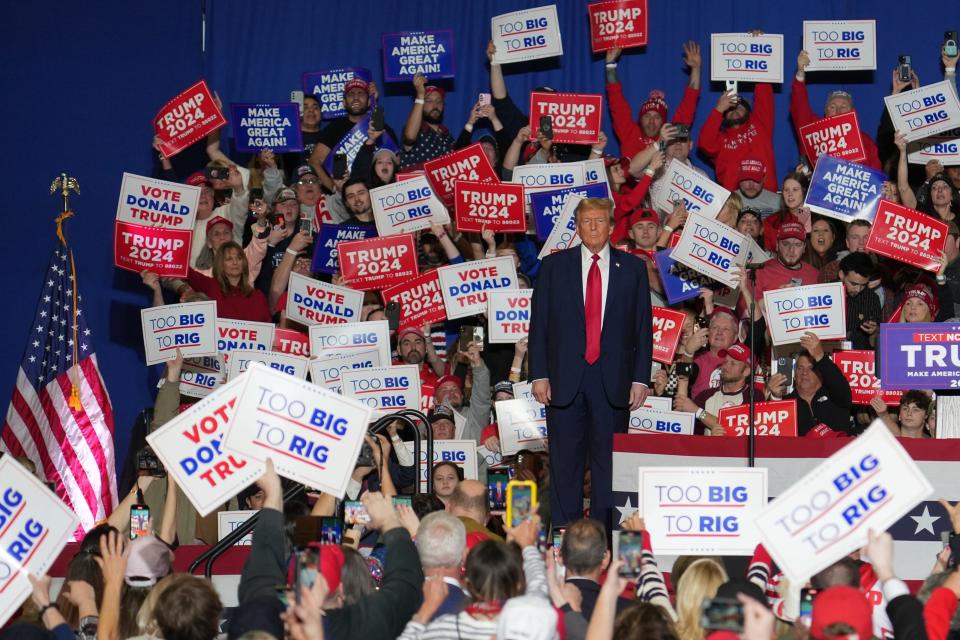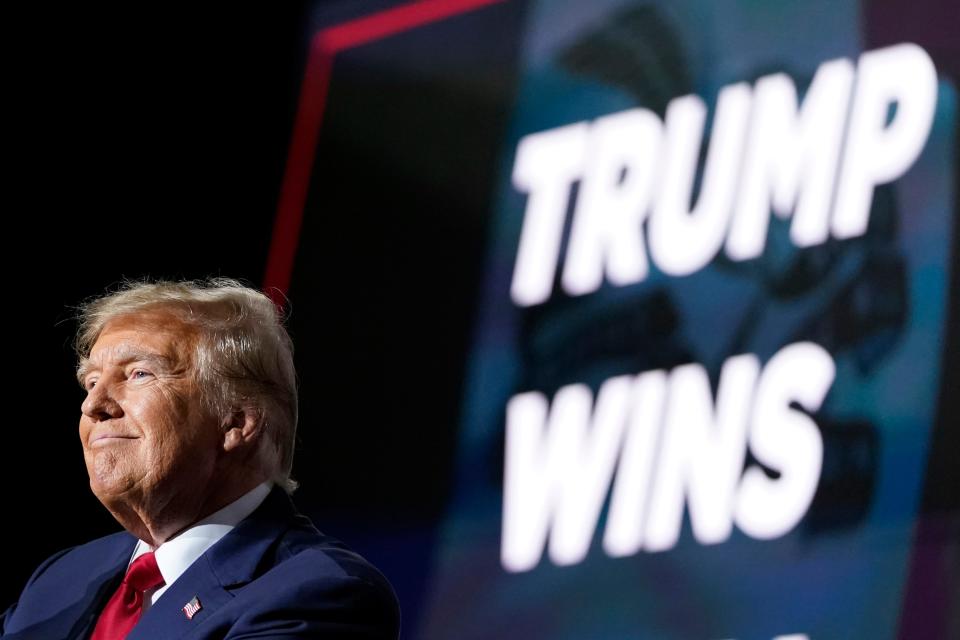Supreme Court rules Donald Trump can stay on Colorado ballot ahead of Super Tuesday.
- Oops!Something went wrong.Please try again later.
- Oops!Something went wrong.Please try again later.
WASHINGTON − The Supreme Court ruled Monday that Colorado can’t use an anti-insurrectionist provision of the Constitution to kick Donald Trump off the ballot, leaving it up to voters to decide whether the former president should be returned to the White House after trying to overturn the results of the 2020 election.
In a unanimous decision, the court reversed the Colorado Supreme Court’s December decision that Trump is disqualified from running for president by a constitutional amendment enacted after the Civil War to keep insurrectionists from holding office. But the three liberal justices criticized the conservative majority's opinion and said the court went further than necessary. And in a rare note of disagreement, one member of the conservative Supreme Court majority − Amy Coney Barrett − also raised some concerns, saying ''the court should turn the national temperature down, not up."
In an unsigned opinion, the justices did not evaluate whether the Jan. 6, 2021, attack on the Capitol was an insurrection and whether Trump engaged in it. Instead, the majority said the Constitution makes Congress, not the states, responsible for enforcing Section 3 of the 14th Amendment.
“We conclude that states may disqualify persons holding or attempting to hold state office,” five of the justices said. “But states have no power under the Constitution to enforce Section 3 with respect to federal offices, especially the presidency.”
Three liberal justices say the majority went further than necessary
The court's three liberal justices agreed that allowing Colorado to remove Trump from the ballot would have created a "chaotic state-by-state patchwork." But they wrote a separate statement criticizing the majority for going further than they said was necessary in order to insulate Trump and the Supreme Court from future controversy.
Read more: Oral arguments may have provided a clue.
"We cannot join an opinion that decides momentous and difficult issues unnecessarily," wrote Sonia Sotomayor, Elena Kagan and Ketanji Brown Jackson. "The majority attempts to insulate all alleged insurrectionists from future challenges to their holding federal office."
Writing separately, Barrett also said she would not have gone as far as her fellow conservative colleagues. But in her two-paragraph statement, Barrett sought to turn the temperature down by emphasizing where they agreed.
“In my judgment, this is not the time to amplify disagreement with stridency. The court has settled a politically charged issue in the volatile season of a presidential election,” she wrote. “For present purposes, our differences are far less important than our unanimity: All nine justices agree on the outcome of this case. That is the message Americans should take home.”

Trump posted on Truth Social that the decision was a "Big win for America!!!"
"Today’s decision, especially the fact that it was unanimous, 9-0, is both unifying and inspirational for the people of the United States of America," Trump told Fox News Digital.
'They had a chance to do the right thing, and they chose not to,' Colorado group says
Citizens for Responsibility and Ethics in Washington (CREW), the watchdog group representing the Colorado voters who challenged Trump's eligibility, disputed Trump's characterization that he won big. The court had the chance to exonerate Trump as an insurrectionist and chose not to do so, said CREW President Noah Bookbinder.
"The Supreme Court removed an enforcement mechanism, and in letting Trump back on the ballot, they failed to meet the moment," Bookbinder said. "But it is now clear that Trump led the January 6th insurrection, and it will be up to the American people to ensure accountability.”
Notre Dame Law School professor Derek Muller said the insurrection question will "remain live and disputed in the public domain in the months to come."
But the court's decision, he said, "shuts the door on any exclusion of Trump from the ballot in any state, either in the primary or the general."
Maine’s secretary of state had also had declared Trump ineligible, a decision that – like the one in Colorado − was put on hold until the Supreme Court weighed in. And a judge in Illinois likewise has said Trump should be removed from the state's ballot.
Colorado and Maine are among the many states holding primaries Tuesday.
The Colorado challenge was the high court’s biggest presidential election case since stopping Florida’s recount of the 2000 presidential contest, effectively confirming the election of George W. Bush.
But unlike that decision, which split along ideological lines, Monday’s ruling overturning Colorado's ruling was more united despite the widening of political divisions since 2000.
During oral arguments, the court’s liberal justices had voiced concerns similar to those of the conservative majority that allowing one state to disqualify a national candidate would be a recipe for disorder and confusion.
Dozens of challenges to Trump were filed around the country. Some state courts and officials looked at the idea and passed, including in Oregon, California, Minnesota and Michigan.
Trump has accused his opponents of trying to defeat him through an anti-democratic method. Keeping him off the ballot would disenfranchise the tens millions of Americans who want to vote for him, his lawyers told the Supreme Court.
Lawyers for the four Republican and two independent Colorado voters who challenged Trump’s eligibility argued it was Trump who tried to disenfranchise the 80 million people who voted against him in 2020 by refusing to accept that he lost.
Some Democrats uncomfortable with the ballot challenges
But even some Democrats were uncomfortable with the ballot challenges for practical or other reasons.
“What always gave me political anxiety was it was the worst of all worlds,” Dan Pfeiffer, a former adviser to President Barack Obama, said on the podcast he co-hosts. “He was going to be off the ballot in one or two states that were noncompetitive. So, we would not be stopping Donald Trump, an insurrectionist from coming to the White House. We would just be giving Donald Trump, an insurrectionist, the opportunity to weaponize decisions by a few states that may help him return to the White House as an insurrectionist.”
Trump’s lawyers rejected the accusation that Trump was to blame for the Jan. 6, 2021, violence at the U.S. Capitol as Congress sought to certify the election results. They also argued the attack was a riot and not an insurrection as that term is used in the 14th Amendment.
Krista Kafer, a longtime Colorado Republican voter who was among those who sued to keep Trump off the ballot, said she was disappointed but not surprised by the court's decision. Although she had voted for Trump, in part because he had promised to appoint conservative justices to the Supreme Court, she argued his actions connected to Jan. 6 invalidated him as a candidate.
The challenge "was the right things to do," Kafer said. "Still glad I did it."
More: Unanimous? Top takeaways from Supreme Court's ruling to keep Trump on the ballot
Contributing: Trevor Hughes and Bart Jansen

This article originally appeared on USA TODAY: Supreme Court rules Donald Trump can stay on Colorado primary ballot

